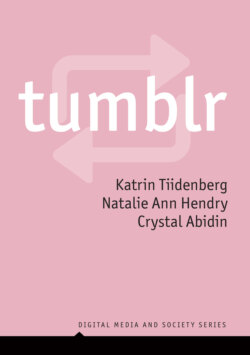Читать книгу Tumblr - Tama Leaver, Crystal Abidin - Страница 15
Our research methods
ОглавлениеWe have been researching tumblr since 2011. To understand tumblr practices, cultures, vernacular, and sensibilities, we have – between the three of us – conducted a decade’s worth of multifaceted ethnographic fieldwork, comprising:
observations across different tumblr silos and in various tumblr communities (network of eating disorder blogs, NSFW selfie community, East Asian NSFW tumblr communities, various K-pop fandoms, Supernatural and Teen Wolf fandoms and meta-tumblr fandoms, mental health blogs including Borderline Personality Disorder communities and art blogs related to mental health, queer tumblr);
approximately one hundred individual interviews, approximately ten group interviews, focus groups, and creative workshops, and twelve image elicitation conversations with tumblr users;
analyses of an uncountable number of tumblr posts, tumblr blogs, and hashtag conversations in English, Chinese, and Japanese, using content-, thematic-, discourse-, and narrative-analysis;
hashtag and keyword mapping exercises; and
participant observation in school and hospital settings.
To contextualize what is happening on the platform and how tumblr users make sense of it, we have studied tumblr as a corporately owned technical structure. For this, we have analyzed:
hundreds of trade press and news articles, interviews with key tumblr employees, and marketing, pop culture, and technology blogs (e.g., Adweek, The Atlantic, Bustle, CNET, Fast Company, Forbes, Gawker, the Guardian, i-D, Mashable, The New York Times, Popsugar, The Ringer, TechCrunch, The Verge, Vice, Wall Street Journal, Wired);
fourteen years’ worth of tumblr’s marketing (press releases, tag lines, app store descriptions) and governance (Terms of Service Agreements, Community Guidelines, Privacy Policy, About page, Help page, Staff Blog posts), texts procured using Google search, the Wayback Machine, and updates logged on Github.
At moments of heightened attention to tumblr (e.g., the 2012 content moderation change, the 2018 NSFW ban, various changes of ownership), we have gathered – both manually and using automated scraping tools – content regarding tumblr that was sourced either from tumblr itself or via other social media sites (e.g., Buzzfeed, Facebook, Pinterest, Twitter, YouTube).
Finally, we analyzed tumblr features, functionalities, and interfaces across the years drawing from our personal research archives of fieldnotes and screenshots, the Wayback Machine, and conducted a systematic walkthrough of the platform and its app in 2020.
Our arguments rely on our extensive empirical work, but also dialogue with the research conducted by our colleagues. Wherever possible, we allow our research participants to speak for themselves, quoting interview snippets or reproducing sections of blog posts. Whenever we quote people we interviewed, we refer to them by research pseudonyms, as agreed in our informed consent negotiations. Where we reproduce images or posts, we follow three strategies. Publicly accessible, noncontroversial, widely shared content is reproduced as is, or anonymized. Where we have needed to depict a practice (e.g., the massive nested system of reblogs converging in a single post), illustrate the interface (e.g., notes showing all the likes and reblogs and comments), or reproduce contentious material (e.g., thinspo, NSFW content), we err on the side of caution and care – we use artist impressions to convey these visual practices or publish blog outtakes without linking them either to a tumblr username or to the research-based pseudonym linked to interview quotes. Where content is not contentious, but we have been uncertain about whether users would like their usernames reproduced, we have modified screenshots or commissioned artist impressions to preserve user or content confidentiality; however, where we have felt it important for the user to be acknowledged and credited for their creative contributions, we name them briefly.
Writing this book has been a labor of love and we are happy and grateful that you have chosen to come on this journey with us. Thank you.
